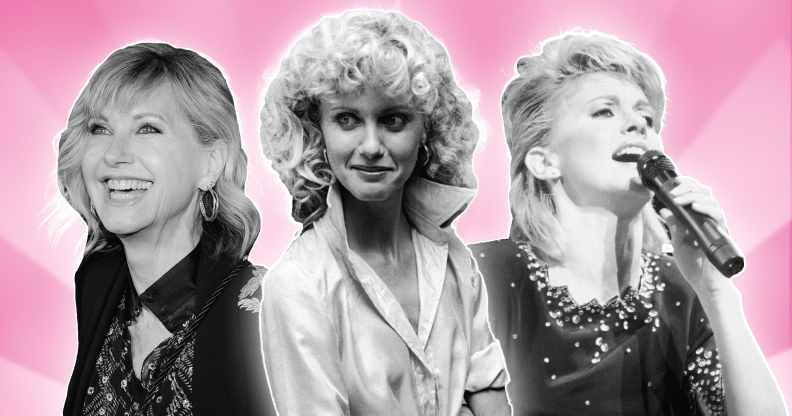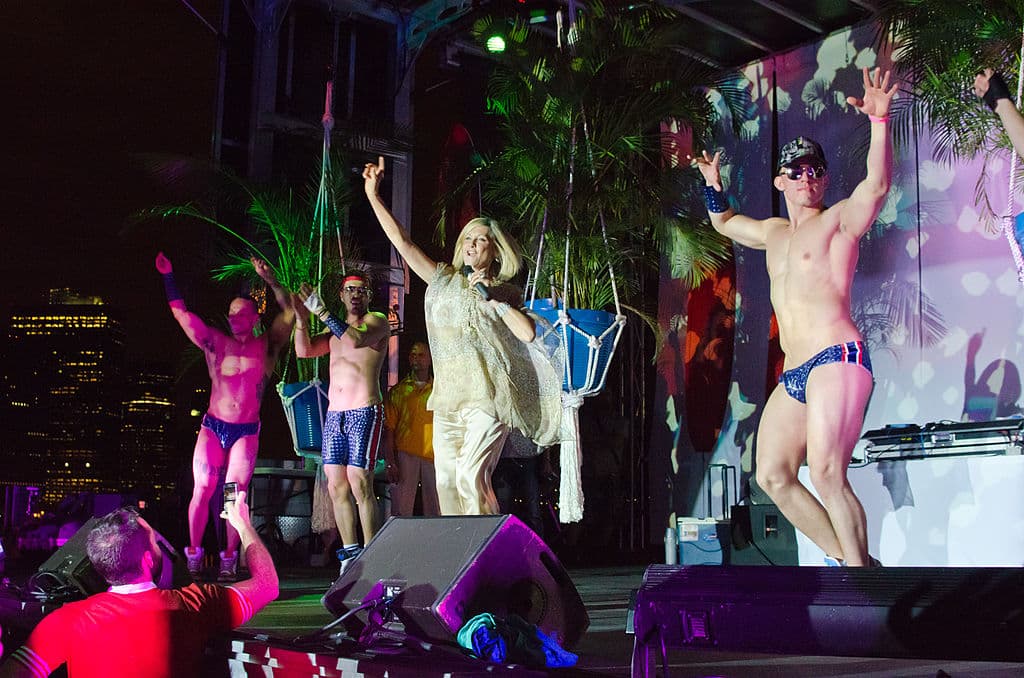6 times Olivia Newton-John was the ultimate gay icon: From Xanadu to defending LGBTQ+ rights

Olivia Newton-John has died aged 73. (Getty/PinkNews)
Olivia Newton-John leaves behind a legacy of LGBTQ+ allyship and a glittering career that makes her an eternal gay icon.
The singer, actor and all-round legend died at the age of 73, her family confirmed in a statement on Monday (8 August). She had been vocal about her journey with breast cancer, which began three decades ago.
Over the course of a decades-spanning career, Olivia Newton-John proved time and time again that she was an icon for the ages – a singer who could perform ballads for the masses as well as anthems for gay clubs.
Newton-John had already made a name for herself by 1978, when she starred opposite John Travolta in Grease, but the film cemented her place as one of the great icons of her day.
She went on to release the song “Physical”, which became one of the biggest hits of the ’80s, and solidified her position as a legend.
View this post on Instagram
As we remember Olivia Newton-John’s impact, we take a look back at six times she proved she was the ultimate gay icon.
1. The music video for ‘Physical’ is literally the gayest thing on earth
It’s genuinely baffling that Olivia Newton-John got away with the music video for “Physical” in 1981. The rock-infused track quickly generated controversy for its sexualised lyrics, and it marked an end to the clean-cut image Newton-John had been known for.
The music video is a different beast altogether. The clip sees Newton-John acting as a fitness instructor to a group who aren’t that well-versed with gym equipment.
The “Physical” video is predominantly played for laughs, but it’s the end that really cemented her position as a gay icon.
Tragically for Newton-John, none of the muscle-clad men are very interested in her – they’re too busy admiring their own muscles. The video ends with the men walking into the locker room, hand in hand, as a confused Newton-John watches on.
2. Olivia Newton-John’s Grease transformation is basically every gay man’s trajectory in life
At the end of Grease, Sandy does what every queer person eventually does – she turns “bad”, and by bad, we mean she wears black, skin-tight clothes, puts on some make-up, and starts smoking.
Olivia Newton-John’s performance in Grease is well-remembered for numerous reasons – one is that she was almost 30 when playing a high-school student. But for the most part, it became her most defining role because of the breadth and depth she brought to the character.
It’s perhaps her final scenes in the film that solidified her as position as a gay icon. She proved that it was possible to own her sexuality, to change her image, and to move with the times. Grease helped her shed her good-girl image in her own music career too, allowing her to move into the ’80s with grace.
3. She was a tireless supporter of same-sex marriage

Olivia Newton John (C) performs at the 2011 Fornabaiovoss Events’ Pride Celebration at Governor’s Island on June 25, 2011 in New York City. (Michael Stewart/WireImage)
Queer people of the day knew Olivia Newton-John was someone to be trusted – how could she not be after “Physical”?
She proved time and time again throughout her life that she was a fierce ally who would advocate for queer people wherever possible.
In 2012, she spoke out in favour of same-sex marriage, saying: “With respect to marriage equality, I believe that no-one has the right to judge and deny couples who love each other the ability to make a marriage commitment. Love is love.”
She later opened up to The Advocate about what it was like to perform at New York Pride the night after the state introduced same-sex marriage.
“The air was electric, and there was so much excitement in the air from the couples,” Newton-John said.
“I think love is love. You find it when you can. It’s wonderful that it can be recognised. People who have had long relationships and care about each other and take care of each other should have the right to be married.”
4. Olivia Newton-John represented the UK at Eurovision – and lost to ABBA
https://www.youtube.com/watch?v=9zExYYjoxqI
Four years before Grease turned her into one of the biggest names in music, Olivia Newton-John represented the UK in the Eurovision Song Contest with the song “Long Live Love”.
It’s very of its time. In her performance, Newton-John – who was born in Cambridge, England, but grew up in Australia – stands in a floor-length, flowing blue dress as she and an entourage of backing singers blast their way through what can best be described as a bit of a cheesy ballad.
She finished in fourth place with 14 points, ultimately losing out to ABBA. The Swedish group won the contest with “Waterloo”, which was only fair really.
5. Her 1980 film Xanadu was made for the gays – and we’re still here for it
It should have been a smash hit, but tragically, it wasn’t meant to be. In 1980, Olivia Newton-John teamed up with none other than Gene Kelly for the musical fantasy film Xanadu, which featured music from Electric Light Orchestra, Cliff Richard and The Tubes.
The film was poorly received by critics (we’re being nice – it was trounced). It apparently even inspired the first ever Golden Raspberry Awards, which were set up to specifically recognise Xanadu.
Still, that didn’t stop it from becoming a cult classic – and queer people in particular love it. It’s dubbed as a “roller disco” picture – what’s not to love?
The title track proved a hit for Newton-John (justifiably), and it paved the way for her to start crafting the poppier image she became known for with her “Physical” era.
6. She helped shine a light on the AIDS epidemic with the film It’s My Party
Olivia Newton-John also appeared in the 1996 It’s My Party, which was one of the first feature films to tackle the issue of AIDS patients dying without dignity.
The film revolves around a party hosted by gay architect Nick (Eric Roberts), who decides to take his own life due to his AIDS diagnosis.
Newton-John won praise from her gay fans for starring in the film, which helped raise awareness about HIV and AIDS.

